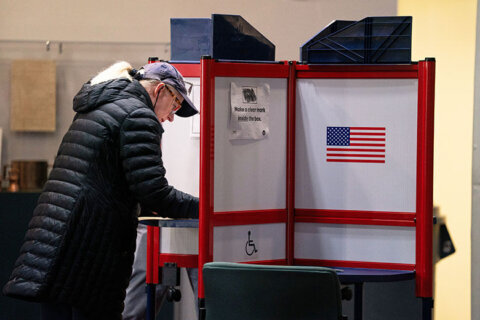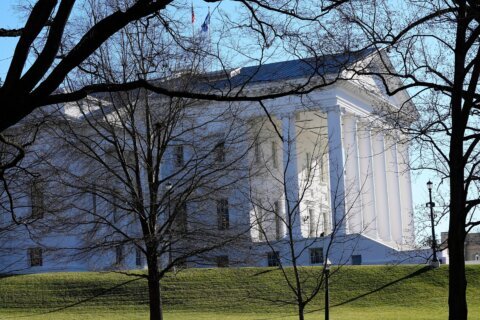This article was reprinted with permission from Virginia Mercury.
A few weeks ago, former Virginia Senate GOP leader Tommy Norment contacted a pair of Charles City County election officials with an unusual request.
As an attorney, Norment is representing a Republican member of the Charles City Electoral Board, Maria Anne Kinney, whose feud with other election officials in the county has led to her facing a misdemeanor assault charge. That charge, set to be heard in court next month, arose from an alleged shoving incident at the county’s election office on June 11.
With tensions rising just before the June 18 primary, Norment said it might be best for the two election officials, Registrar DeNay Harris and her deputy Lisa Cosby, to steer clear of Kinney on election day in the small county east of Richmond.
Though all three women had jobs to do overseeing primary voting, Norment specifically asked Harris and Cosby not to go to the polling place where Kinney would be.
“If you insist on stopping at her precinct in spite of my respectful request, please do NOT approach her or speak to her in any manner whatsoever,” Norment wrote in the June 14 email. “I have asked Mrs. Kinney to call my cell phone if you do come to her assigned precinct. If need be I will dispatch a sheriff’s deputy to the precinct to [ensure] there is not interaction initiated on your behalf. We do not need to escalate this situation.”
If Harris and Cosby had any questions or concerns, Norment added, they should “contact an attorney of your choosing.”
Harris, Charles City’s top election official, didn’t take it as a respectful request.
“I don’t believe you can tell me not to attend the polling place when it is my job,” Harris wrote, adding that she felt Norment had no business contacting Cosby at all because Cosby is the alleged victim in the pending assault case.
The sharply worded email exchange between a local election official and an ex-senator whose final term in office expired at the end of 2023 was recently shared with the State Board of Elections. Before the assault accusation emerged, the board was already trying to decide whether Kinney’s conduct should lead to her being removed from her role overseeing elections in Charles City.
The emails were included in a trove of material about the conflict in Charles City published as part of the agenda for next Tuesday’s state elections board meeting. At that meeting, the board will certify the primary results and potentially make a decision on what to do about Kinney.
The controversy involves a variety of allegations against Kinney, mostly centered on claims she’s refused to carry out the duties of an electoral board member and has been unable to act in a nonpartisan manner. Kinney, who joined the board in January, has disputed most of those accusations, saying her attempts to get situated as a new member have been stymied by open hostility from her colleagues.
The state board first heard details of the Charles City matter on May 28, but deferred a decision on whether Kinney should be removed so that it could gather more evidence. The state board can’t remove Kinney from the county board on its own, but can initiate legal proceedings to have a judge consider removing her.
Even with Charles City on notice that the state was watching, things didn’t cool down in the county’s election office.
The assault charge was leveled after a June 11 meeting at the election office focused on pre-processing of absentee ballots. Harris told state officials Kinney arrived with another Republican representative who wanted to observe the process. Amid a dispute over whether the process was or wasn’t open to the public, Kinney pushed past Cosby, according to multiple witness accounts sent to state election officials.
Cosby reported the alleged push to law enforcement the next day. An incident report from the county sheriff’s office said Cosby related that Kinney “pushed into the left side of Cosby’s body forcing her way back into the room.”
The feud spilling over into the court system appeared to be what got Norment involved and preceded his email to Harris and Cosby.
The records show Norment replied to Harris less than 10 minutes after she fired back at him. He said he respected her position and was “merely trying to avoid any further interactions that might exacerbate the situation.
“I will not contact you again as I think you have overreacted,” Norment wrote.
Harris didn’t let it go.
“I appreciate your concern for me, but I am not the one who is overreacting,” she wrote. “I responded to an email from a very seasoned Attorney who contacted me and the victim, which is very intimidating when we are already scared and have issues with what happened. So I apologize if you believe my response to your demand was what seemed to be overreacting”
Norment then said he didn’t mean to “irritate” Harris, offered an apology if he offended her and predicted the primary would go smoothly if “everyone is civil and just does their job.”
In her final response, Harris said Norment had “bullied” her and Cosby and said she agreed “no communication is best at this point.” Norment said he had no intention of bullying, adding “if you felt that way, I apologize.”
Harris declined to comment further. Norment didn’t immediately respond to a request for comment Thursday morning.
Though personal beefs aren’t all that unusual in local government, the situation in Charles City has raised a novel problem: What happens if two people in charge of carrying out critical election business can’t coexist in the same room?
In a subsequent email, Norment informed Harris that Kinney wouldn’t be attending the county’s post-primary canvass on June 20 because a judge had approved a preliminary protective order instructing Kinney to have no contact with Cosby. Norment said that meant the two parties can’t be within 100 feet of each other.
“I do not even want the opportunity for a technical violation,” he wrote.







